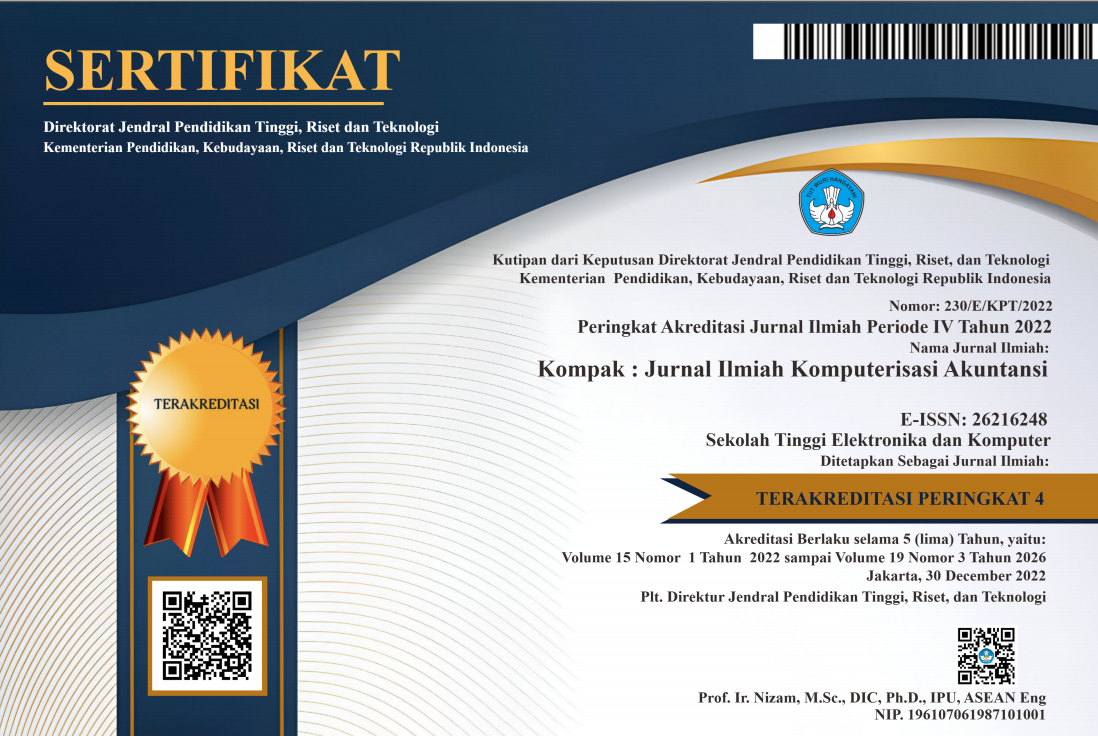Pengaruh Financial Attitudes, Risk Perception, dan Locus of Control Terhadap Invesment Intention Pada Generasi Milenial
DOI:
https://doi.org/10.51903/kompak.v17i2.2045Kata Kunci:
Financial Attitudes, Risk Perception, Locus of Control, Investment IntentionAbstrak
Penelitian ini berlandaskan pada perubahan perilaku dalam keuangan mengenai investasi, tingginya minat investasi di masyarakat dalam perdagangan bursa efek menjadikan topik yang perlu dibahas dari sudut pandang perilaku. Dimana dalam penelitian ini menggunakan theory of planned behaviour sebagai teori dalam mengembangkan variabel. Sehingga variabel yang peneliti pilih yaitu financial attitude, risk perception, dan locus of control. Penelitian ini bertujuan untuk menganalisis tentang pengaruh financial attitude, risk perception, dan locus of control terhadap investment intention pada generasi milenial. Lokasi penelitian ini dilakukan di Jakarta. Penelitian ini menggunakan pendekatan kuantitatif dengan pengambilan sampel menggunakan teknik non probability sampling dengan metode purposive sampling. Dalam penelitian ini melibatkan 100 responden yang tersebar DKI Jakarta. Dalam menganlisis data peneliti menggunakan analisis regresi linier berganda. Berdasarkan hasil penelitian menunjukkan bahwa secara simultan financial attitude, risk perception, dan locus of control berpengaruh positif dan signifikan terhadap Investment Intention.
Referensi
Ajzen, I. (2020). The theory of planned behavior: Frequently asked questions. Human Behavior and Emerging Technologies, 2(4), 314–324. https://doi.org/10.1002/hbe2.195
Alharbey, M., & Van Hemmen, S. (2021). Investor Intention in Equity Crowdfunding. Does Trust Matter? Journal of Risk and Financial Management, 14(2), 53. https://doi.org/10.3390/jrfm14020053
Arifin, A. Z., & Widjaya, I. (2022). The Effect of Financial Knowledge, Financial Experience, and Locus of Control Towards Investment Decision of Non-Depository Investors. Proceedings of the 3rd Tarumanagara International Conference on the Applications of Social Sciences and Humanities (TICASH 2021), 655(Ticash 2021), 761–766. https://doi.org/10.2991/assehr.k.220404.120
Arnold, J., & Randall, R. (2015). Work Psychology (7th ed.). Prentice Hall.
Ayudya, A. C., & Wibowo, A. (2018). The Intention to Use E-Money using Theory of Planned Behavior and Locus of Control. Jurnal Keuangan Dan Perbankan, 22(2), 335–349. https://doi.org/10.26905/jkdp.v22i2.1691
Chaswa, E. N., Kosamu, I. B. M., Kumwenda, S., & Utembe, W. (2020). Risk perception and its influencing factors among construction workers in Malawi. Safety, 6(2), 1–12. https://doi.org/10.3390/safety6020033
Databoks. (2022). Realisasi Investasi Indonesia Naik Terus dalam 5 Tahun Terakhir.
Gatti, L., Pizzetti, M., & Seele, P. (2021). Green lies and their effect on intention to invest. Journal of Business Research, 127(January), 228–240. https://doi.org/10.1016/j.jbusres.2021.01.028
Gosal, G. G., & Tania, J. B. I. (2022). Analysis of Differences in the Investment Intention Characteristics Based on Gender. Primanomics: Jurnal Ekonomi & Bisnis, 20(1), 64–73.
Hartono, W., & Dewantoro, A. W. (2021). Factor Analysis of Millennial’S Stock Investment Intention in Surabaya; Is Accounting Studies Used As a Fundamental Analysis? International Journal of Accounting, Finance and Business (IJAFB), 6, 165–180.
Ilyas, M., Moeljadi, & Djawahir, A. H. (2022). The effect of financial knowledge and financial well-being on investment intention mediated by financial attitude. International Journal of Research in Business and Social Science (2147- 4478), 10(8), 175–188. https://doi.org/10.20525/ijrbs.v10i8.1530
Mahafani, D. F., Puspa, D. M., Khasanah, N., Wulandari, S., & Andriani, V. (2021). Analisis Perilaku Generasi Milenial Dalam Pengambilan Keputusan Investasi Saham Di Masa Pandemi Covid-19. Journal of Multidisciplinary Studies, 5(1), 121–140.
McWilliams, D., Lennon, C., & Lowery, J. (2022). Impact of Experience and Education on Risk Attitude and Risk Perception of Supply Chain Management Professionals. Operations and Supply Chain Management, 15(1), 56–68. https://doi.org/10.31387/oscm0480330
Nugroho, A. P., & Apriliana, R. M. (2021). Islamic Financial Literacy and Intention to Use Gopay in Yogyakarta: Extended Theory of Acceptance Models. International Conference on Islamic Studies and Social Sciences (ICONISSS) 2021, 2022(January), 329–338. https://doi.org/10.18502/kss.v7i10.11370
Onasie, V., & Widoatmodjo, S. (2020). Niat Investasi Generasi Milenial Di Pasar Modal. Jurnal Manajerial Dan Kewirausahaan, 2(2), 318. https://doi.org/10.24912/jmk.v2i2.7924
Putri, D. H., & Hanggraeni, D. (2022). Determinants of Risky Investment Intention among Generation Y: An Evidence from Indonesia. Asian Journal of Research in Business and Management, 4(1), 41–51. https://doi.org/10.55057/ajrbm.2022.4.1.4
Rudiwantoro, A. (2018). Langkah Penting Generasi Millennial Menuju Kebebasan Finansial Melalui Investasi. Jurnal Moneter, 5(1), 44–51.
Salisa, N. R. (2021). Faktor yang Mempengaruhi Minat Investasi di Pasar Modal: Pendekatan Theory of Planned Behaviour (TPB). Jurnal Akuntansi Indonesia, 9(2), 182. https://doi.org/10.30659/jai.9.2.182-194
Sathiyamurthi, K., Devi, K., & Nirmal Raj, A. (2021). Computational analysis and intelligence for mediating effect of investment knowledge on investment intention and investment behaviors. Materials Today: Proceedings, xxxx, 1–5. https://doi.org/10.1016/j.matpr.2021.01.062
Seni, N. N. A., & Ratnadi, N. M. D. (2017). Theory of Planned Behavior Untuk Memprediksi Niat Berinvestasi. E-Jurnal Ekonomi Dan Bisnis Universitas Udayana, 12, 4043. https://doi.org/10.24843/eeb.2017.v06.i12.p01
Siegrist, M. (2021). Trust and Risk Perception: A Critical Review of the Literature. Risk Analysis, 41(3), 480–490. https://doi.org/10.1111/risa.13325
Sulistyowati, N. W. (2021). Pengaruh Motivasi Ekstrinsik dan Prestasi Belajar Akuntansi Terhadap Minat Investasi dan Keputusan Investasi Mahasiswa FE Program Studi Akuntansi UNESA. Jurnal Ekonomi Pendidikan Dan Kewirausahaan, 3(1), 76–90. https://doi.org/https://doi.org/10.26740/jepk.v3n1.p76-90
Suprihandari, M. D., Prasetyo, H. D., & Rahardjo, K. A. (2020). Cryptocurrency : Take It Or Leave It. Academia.Edu, 11(2), 55–58. https://doi.org/10.9790/5933-1102035558
Syaliha, A., Sutieman, E., Pasolo, M. R., & Pattiasina, V. (2022). The Effect of Financial Literacy, Life Style, Financial Attitude and Locus of Control to Financial Management Behavior. PUBLIC POLICY (Jurnal Aplikasi Kebijakan Publik & Bisnis), 3(1), 52–71. https://doi.org/10.51135/publicpolicy.v3.i1.p52-71
TheIndonesia Capital Market Institute. (2022). Financial Highlights.
Widoatmodjo, S., & Onasie, V. (2021). Gender and Millennials in Indonesian Capital Market. Proceedings of the Ninth International Conference on Entrepreneurship and Business Management (ICEBM 2020), 174(Icebm 2020), 400–407. https://doi.org/10.2991/aebmr.k.210507.060
Wieland, I., Kovács, L., & Savchenko, T. (2020). Conceptual study of the difference between the money market and the capital market. Financial Markets, Institutions and Risks, 4(1), 51–59. https://doi.org/10.21272/fmir.4(1).51-59.2020
Yolanda, Y., & Tasman, A. (2020). Pengaruh Financial Literacy dan Risk Perception terhadap Keputusan Investasi Generasi Millennial Kota Padang. Jurnal Ecogen, 3(1), 144. https://doi.org/10.24036/jmpe.v3i1.8533
Yoopetch, C., & Chaithanapat, P. (2021). The effect of financial attitude, financial behavior and subjective norm on stock investment intention. Kasetsart Journal of Social Sciences, 42(3), 501–508. https://doi.org/10.34044/j.kjss.2021.42.3.08
Zandi, G., Torabi, R., Yu, O. T., Sivalingam, A. D., & Khong, T. T. (2021). Factors affecting the intention of generation y in malaysia to invest for retirement. Advances in Mathematics: Scientific Journal, 10(3), 1485–1507. https://doi.org/10.37418/amsj.10.3.36















.png)



